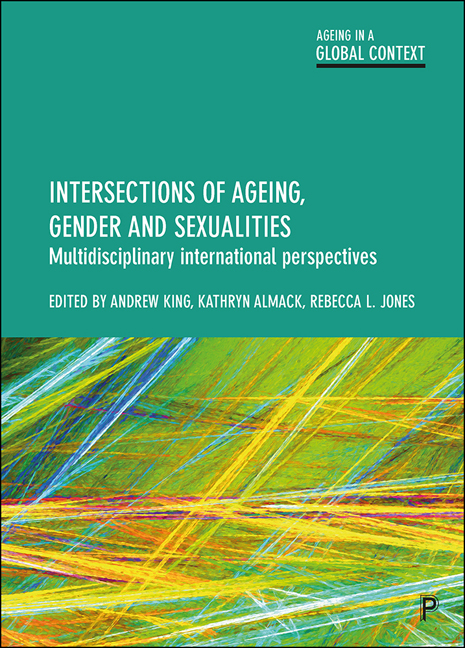two - On the intersections of age, gender and sexualities in research on ageing
Published online by Cambridge University Press: 27 April 2022
Summary
Despite its widespread usage in the social sciences, intersectionality remains an uncommon and unclear approach in ageing. This chapter lays out general contours of what an intersectional framework does (and does not) entail, and then briefly applies this approach to explore how age, gender and sexual inequalities might shape spousal/partner caregiving.
Intersectionality
Although intersectionality may be a ‘buzzword’, it is a somewhat ambiguous and open-ended concept (Davis, 2008). Debates concerning how it should be conceptualised are ongoing (Carbado, 2013), and journals have devoted special issues (for example, Gender & Society, 2012; Signs: Journal of Women in Culture and Society, 2013; DuBois Review, 2013) to them. Still, common themes underlie intersectional frameworks, and these are outlined later.
Scholars and activists had discussed the ways that black women's experiences were rendered invisible or marginalised since the 1960s (Davis, 2008; Collins and Bilge, 2016), but legal scholar Kimberlè Crenshaw was the first to apply the label ‹intersectionality› to characterise these. She used this term to suggest how ‘the intersection of racism and sexism factors into Black women›s lives in ways that cannot be captured wholly by looking at the race or gender dimensions of those experiences separately’ (Crenshaw, 1991: 1224). Of importance to the discussion here, Crenshaw was drawing attention to the ways in which two systems of inequality, race and gender, combine to produce unique social locations and experiences.
Intersectionality is simultaneously a theoretical and methodological approach to understanding inequalities (Choo and Ferree, 2010; Clarke and McCall, 2013); an analytic tool for ‘understanding and analysing the complexity in the world’ (Collins and Bilge, 2016: 25). It does not only look at different outcomes and what might cause these, nor does it just refer to interactions among variables. What makes an approach intersectional is, first, its explicit focus on social inequalities, such as race and gender; and second, the lens through which these inequalities are explored, one which recognises that, ‘people's lives and the organization of power in a given society are better understood as being shaped not by a single axis of social division, be it race or gender or class, but by many axes that work together and influence each other’ (Collins and Bilge 2016: 2; emphasis added). This dual focus on inequalities and how they are interrelated is what distinguishes an intersectional framework from other approaches to differences.
- Type
- Chapter
- Information
- Intersections of Ageing, Gender and SexualitiesMultidisciplinary International Perspectives, pp. 13 - 30Publisher: Bristol University PressPrint publication year: 2019



